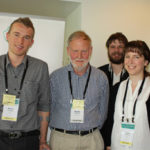

So much to do and so much opportunity
March 26, 2014
We’re keen to encourage young Australians into agricultural science, and more so, young scientists into international agricultural research. Read a recent report from one of our conference scholars which highlights the passion that can be generated by knowing more about food security issues.
To this end, we assist with volunteer placements through the Australian Youth Ambassadors program, offer some free places to students to attend our annual conferences, and we have funded young Australians from around the country to attend our last three conferences. This recent report is from one of the 2012 conference scholars, Kaylia Cameron, from the University of Tasmania.
“Attending the Crawford Fund Annual Parliamentary Conference was an eye-opening experience. Prior to going, I was very unaware of the necessity, opportunities, and activity in agricultural research and development overseas. Having grown up in the north west of Tasmania and never travelled internationally, my worldview was, and I think to some degree still is, very limited by low exposure to the issues facing developing countries.
We hear a lot on the news and in the media about the need to introduce healthcare and education into poorly developed countries, and I think that less is known about the challenges in agriculture because we know there is some industry, all-be-it poorly managed and educated in some respects. The conference opened my eyes to the gross inefficiencies and continuing challenges in many countries.
The conference theme was food security and natural resources. A recurring topic was the need to address inefficiencies in fertiliser use, both excessive application and reduced income in India, and the low availability and unaffordability of nutrients in most of Africa. Lack of fertiliser is limiting production in Africa more than any other factor, and there is a great need to develop agronomic skills to maximise efficiency. We also need to do more research on soil science and nutrient cycling in many areas.

Another topic was the great need to merge agriculture and environmental conservation as a single approach, not treat the issues and challenges separately. Agriculture needs to find a way to increase production while reducing its environmental footprint, which is a challenge to the sector in both well-developed and poorly developed countries. I think this is a gigantic challenge and requires a bottom-up approach by making local changes to reduce and prevent future environmental damage.
Another observation is that young agriculturalists need to be more conscious of the political decisions around the world that impact how people farm. This includes policy formation in our own country which will influence what opportunity we, as a generation of researchers, agronomists, business people and policy-makers, are able to have on the poor, hungry and malnourished one billion we share this planet with.
I am so grateful to the Crawford Fund for supporting myself and the other young scholars; they have provided a fantastic opportunity to be enlightened on international agriculture and to develop contacts with other people interested in the field. I would strongly encourage young agricultural people to consider applying for a scholarship to get as much exposure to what is happening overseas in your undergraduate as possible. There is so much to do and so much opportunity!”




